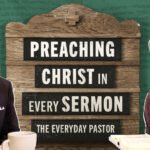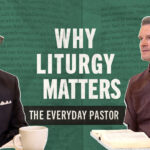Holiness. Do you like that word? Or does it (off the record) sort of make you squirm?
By God’s grace we hear a lot these days about gospel-centered living, books, music, conferences, ministries, and churches. But how often do we hear about gospel-centered obedience? Is there, particularly among young evangelicals, an “enthusiasm gap” between our passion for the gospel and our passion for godliness?
That’s Kevin DeYoung’s concern, and he intends to “mind the gap” in his latest book, The Hole in Our Holiness: Filling the Gap between Gospel Passion and the Pursuit of Godliness (Crossway, 2012). “The hole in our holiness,” DeYoung suggests, “is that we don’t really care much about it.” Readable and timely, clear and compelling, biblically saturated and pastorally sensitive, The Hole in Our Holiness is a fresh call to run after righteousness for the glory of the One who both demands and enables the pursuit.
I corresponded with DeYoung, senior pastor of University Reformed Church in East Lansing, Michigan, about how personal holiness relates to mission, the dangers of excessive “idol hunts” and “spiritual temperature checks,” practical counsel for pastors, and more.
Churches focused on personal holiness don’t always seem to be “on mission.” How do we avoid repeating this mistake?
Two thoughts come to mind. One, we must remember that holiness is part of our mission. Christ calls us to make disciples, not just decisions (Matt. 28:19). Helping people obey Jesus and pursue holiness is an important aspect of the Great Commission (Matt. 28:20). Two, we must emphasize that the pursuit of holiness is really the pursuit of Christ. We aren’t simply trying to be better. We are working—-as God works in us—-to be more like Christ who is in us. In witness and in sanctification we are making Christ known.
You observe that, in many circles today, “We know legalism (salvation by law keeping) and antinomianism (salvation without the need for law keeping) are both wrong, but antinomianism feels like a much safer danger.” How did we get this way, and how do we correct without overcorrecting once more?
The last part of your question answers the first. We overcorrected. When we see churches swallowed up in moralism, self-helpism, and religion by law-keeping, we want to fight against that with all our Galatian might. But with any issue there is a tendency to be so afraid of the mistake we see clearly that we are a bit blind to other mistakes. One of the keys is teach people about the double grace (duplex gratia) of justification and sanctification. Both are gifts from God.
I know I must be holy in order to go to heaven, but isn’t Jesus my holiness? Isn’t his obedience enough for the both of us?
Yes, Jesus is more than holy enough for you. And even for me! It must be clear that the pursuit of holiness is not a pursuit of justification or eternal acceptance with God. The requirement for holiness is not one of merit but of evidence. We must have some grace coming out of our lives to show that grace has come in. Our good works don’t contribute one tiny drop to our acquittal. Jesus paid it all. And when we appropriate this gift by faith, our lives cannot be the same.
What are some dangers associated with lengthy “idol hunts” and frequent “spiritual temperature checks”?
There are several dangers. One, there are always more idols to find. We can always peel back another layer of motivation. It’s possible to deconstruct every act until we feel miserable about things that are truly—-if still imperfectly—-good. Two, we are not very good at checking our spiritual temperature. When we check too frequently (“Am I better today than yesterday?”) or when we check by ourselves (apart from Christian community and church leaders), we are apt to misdiagnosis. Those most holy will be most aware of their sins and probably too hard on themselves, while those who need a checkup the most will pass themselves with flying colors.
Why do you say the distinction between union and communion is practically and pastorally useful?
We need to help people see the difference between the two. Our union with Christ is fixed and secure. We cannot be more or less in union with him. We have been joined to Christ by the Holy Spirit through faith. But our communion with him allows for variance and degrees. Just as you can’t be more or less married, but can have a sweeter or sourer marriage, so it is with Jesus: the union with him has been eternally established, but it is still a dynamic relationship.
Scripture presents various exhortations which appeal to a wide range of motivations. As a pastor, how do you determine when it’s time to counsel someone (1) to run to the cross; (2) to run away from sin; or (3) to run for the crown?
I can’t think of a time when any of the three would be inappropriate. More generally, however, we need to know our people well to know whether they will get farther with pushing or pulling, with alarm or comfort, with a hug or a firm rebuke. One size does not fit all. The Word of God provides many different medicines for our motivation.

































